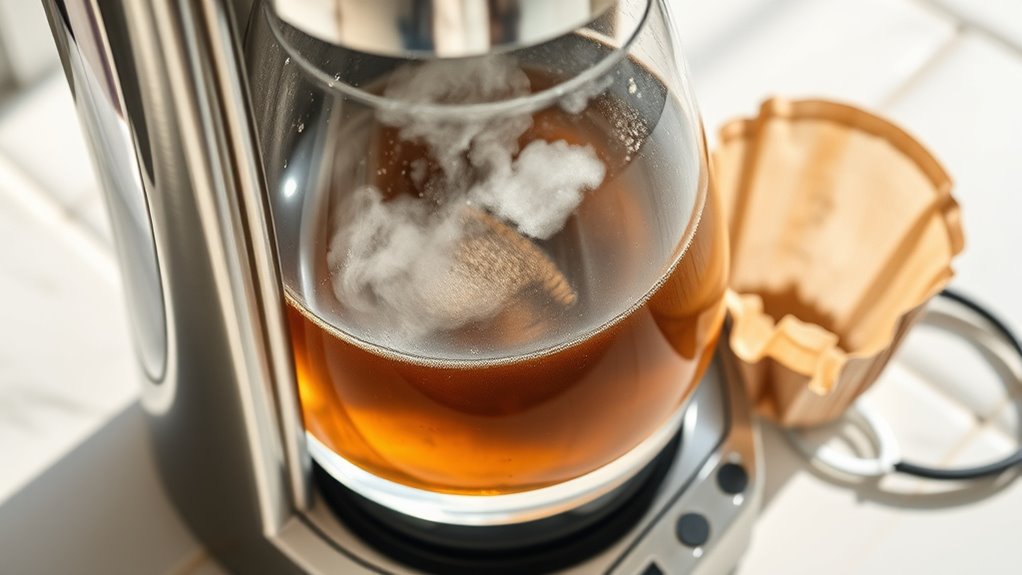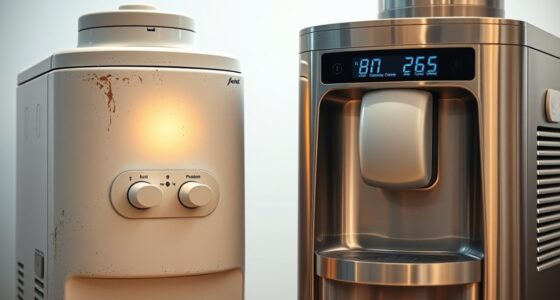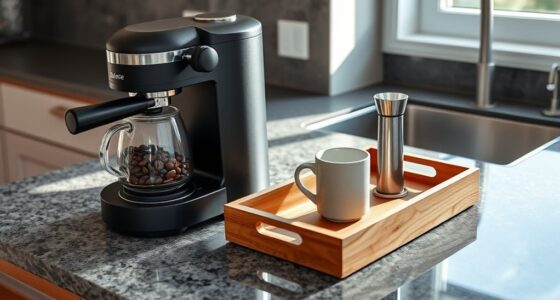If your coffee tastes flat, smells sour, or the machine takes longer to brew, it’s likely dirt and mineral buildup. Regular cleaning and descaling with vinegar or descaling solutions help remove deposits, improve flavor, and extend your coffee maker’s life. Deep cleaning involves washing removable parts, running vinegar cycles, and rinsing thoroughly. To keep your brew fresh and machine in top shape, follow simple maintenance tips—you’ll discover more tips if you keep exploring.
Key Takeaways
- Signs of a dirty coffee maker include sour smells, mineral deposits, slow brewing, and stale-tasting coffee.
- Regular descaling with vinegar or commercial solutions prevents mineral buildup and maintains optimal performance.
- Deep cleaning involves washing removable parts, descaling with vinegar, and thorough rinsing to eliminate residue and odors.
- Using filtered water and installing water softeners can reduce scale buildup and extend your machine’s lifespan.
- Seek professional cleaning if persistent odors, clogs, or performance issues remain despite routine maintenance.
Recognizing the Signs of a Dirty Coffee Maker
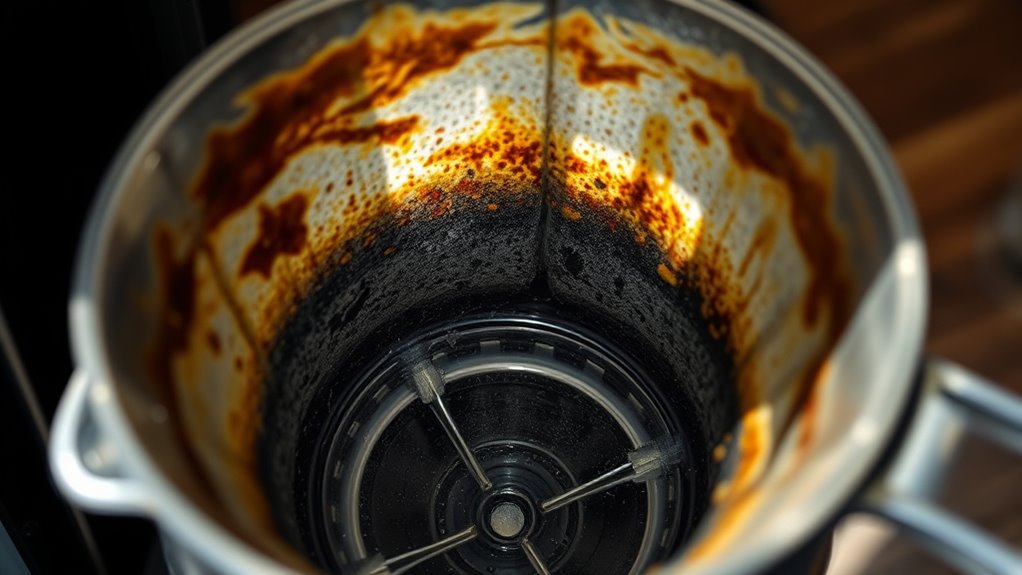
A dirty coffee maker can quickly affect the taste of your brew and even cause equipment problems. One clear sign is coffee maker odors; if your coffee suddenly smells off or sour, it’s likely due to built-up residues. You might also notice a sour or musty smell lingering after brewing. Mineral deposits from hard water can cause visible scaling around the water reservoir or on the heating element, affecting performance. These deposits often lead to slower brewing times or inconsistent temperature control. If your coffee tastes flat or stale despite using fresh beans, it’s a sign your machine needs cleaning. Recognizing these signs early helps prevent bigger issues, ensuring your coffee stays tasty and your machine runs smoothly. Regular maintenance is essential for keeping your coffee maker in optimal condition and prolonging its lifespan. Additionally, descaling helps remove mineral buildup that can impair functionality, and incorporating preventive care practices can further extend the life of your appliance. Regular cleaning and proper care also help prevent residue accumulation that can harbor bacteria and mold, which could pose health risks over time. Being aware of how machine performance relates to cleanliness can motivate you to keep up with routine upkeep.
The Impact of Buildup on Coffee Flavor and Machine Longevity
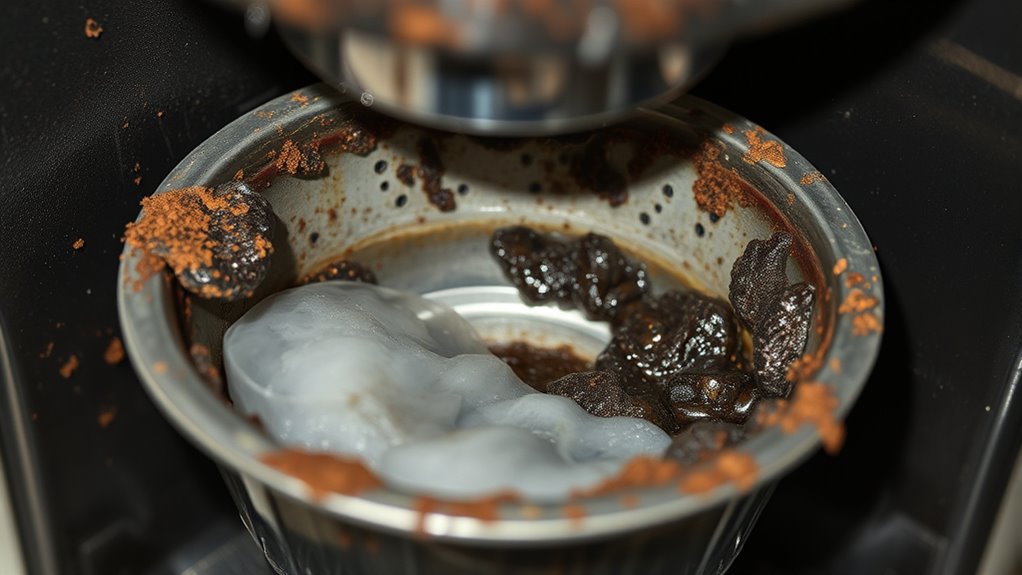
Buildup in your coffee maker can turn your favorite brew bitter and unappealing. It also clogs essential parts, making the machine work harder and less efficiently. Over time, this buildup shortens your coffee maker’s lifespan, leading to costly replacements. Regular cleaning and descaling can help prevent filter clogging and maintain optimal performance. Additionally, understanding the importance of machine maintenance can extend the life of your coffee maker and ensure consistently great-tasting coffee. Properly cleaning your coffee maker is especially important for vetted appliances that are designed for durability and safety. Incorporating home cleaning tips and expert advice on regular upkeep can further safeguard your appliance from unnecessary wear and tear.
Bitter Tasting Coffee
When mineral deposits and residue accumulate inside your coffee maker, they can considerably alter the flavor of your brew, resulting in bitter-tasting coffee. This buildup not only affects the taste but also tarnishes your coffee machine’s aesthetics, making it look dirty and poorly maintained. Over time, these deposits can clog internal parts, reducing efficiency and risking leaks. Additionally, residue buildup can pose user safety concerns, such as overheating or electrical issues, if not cleaned regularly. The bitterness you notice is a clear sign that your machine needs a thorough descaling and cleaning. Removing buildup ensures your coffee tastes fresh and smooth. Plus, maintaining a clean machine extends its lifespan, saves you money, and keeps your brewing process safe and visually appealing. Regular descaling helps prevent mineral deposit buildup, ensuring optimal performance and flavor. Incorporating appliance maintenance plans into your routine can help detect and address these issues early, keeping your coffee maker in top condition.
Clogging of Parts
Accumulated mineral deposits and residue don’t just affect the flavor of your coffee—they can also obstruct essential internal parts of your machine. Over time, mineral buildup can cause your filters to become clogged, reducing water flow and brewing efficiency. Blocked water lines are another common issue, preventing hot water from circulating properly and resulting in weaker or uneven coffee. When filters are clogged, you might notice longer brewing times or a drop in coffee strength. Similarly, blocked water lines can lead to leaks or the machine shutting off unexpectedly. Regular cleaning helps prevent these issues by removing deposits before they become problematic. Additionally, understanding the effects of buildup can help you take proactive steps to maintain your coffee maker. The use of automated cleaning cycles in modern machines can also assist in reducing mineral accumulation. Staying on top of maintenance ensures your coffee maker continues to operate smoothly and delivers the best flavor every time. Incorporating preventive care into your routine can significantly extend your machine’s lifespan and improve your coffee experience.
Shortened Machine Life
If mineral deposits and residue are left unchecked, they can considerably shorten the lifespan of your coffee maker. Buildup from minerals like calcium can clog internal components, forcing the machine to work harder and wear out faster. Using different coffee bean varieties with oils and residues can accelerate this process if you don’t clean regularly. Additionally, inconsistent brewing temperature caused by mineral buildup can affect the machine’s performance and reduce its longevity. Over time, these deposits can cause parts to seize or malfunction, leading to costly repairs or replacement. Regular cleaning maintains ideal brewing temperature and prevents residue from damaging sensitive components. Incorporating preventive maintenance into your routine can further extend your machine’s life. Proper descaling and cleaning routines help to maintain optimal performance and prevent buildup from affecting your coffee quality. Ensuring your machine has proper water quality can also help reduce mineral accumulation. Using filtered water can significantly decrease mineral deposits and keep your machine cleaner longer. By keeping your machine free of buildup, you extend its life, preserve the quality of your coffee, and save money in the long run.
Step-by-Step Guide to Deep Cleaning Your Coffee Machine
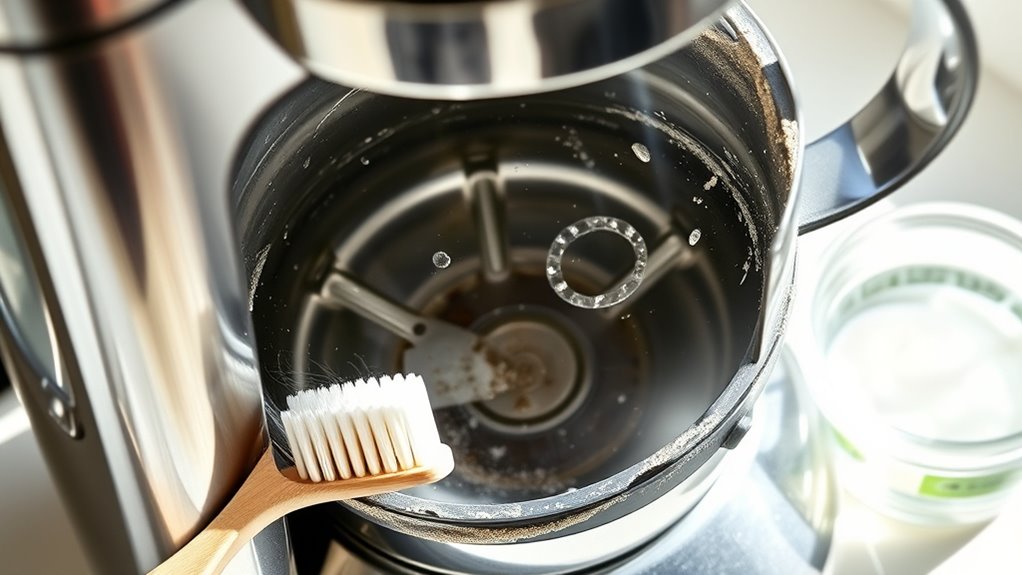
Deep cleaning your coffee machine is essential for maintaining the quality of your brew and extending the appliance’s lifespan. Start by unplugging your machine and removing any removable parts, like the filter basket and carafe. Wash these with warm, soapy water. Next, fill the water reservoir with equal parts water and white vinegar to eliminate mineral buildup. Run a brewing cycle without coffee grounds, ensuring the brewing temperature is ideal for extracting the best flavors from different coffee bean varieties. After the cycle completes, run two more cycles with plain water to rinse out vinegar residue. Wiping down the exterior and any accessible internal parts with a damp cloth helps keep your machine looking new. Regular deep cleaning will ensure your coffee tastes fresh and your machine functions efficiently. Incorporating proper maintenance practices can prevent common issues and keep your coffee maker performing optimally. Additionally, understanding descaling techniques can further enhance your machine’s longevity and performance. To optimize your cleaning routine, consider using natural cleaning agents like essential oils (such as lemon or tea tree oil) diluted appropriately, which can help disinfect and leave a fresh scent.
Natural Solutions for Regular Maintenance
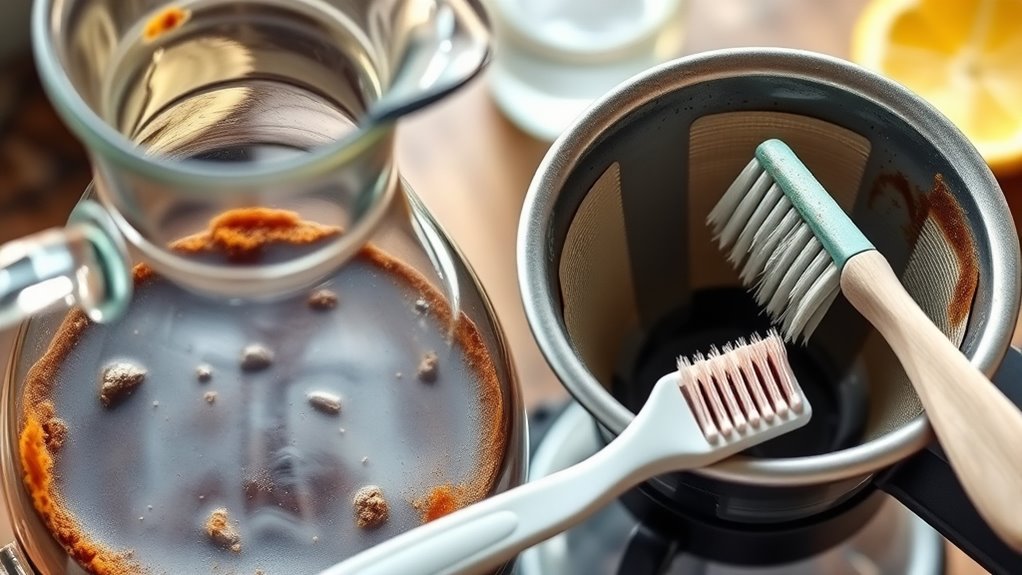
Maintaining your coffee maker with natural solutions is an effective way to keep it clean and functioning well without harsh chemicals. Natural remedies like vinegar and baking soda are powerful, eco-friendly techniques that help break down mineral buildup and eliminate odors. Regularly running a vinegar rinse once a month can prevent scale accumulation, while baking soda can freshen the machine’s interior and remove stubborn stains. These eco-friendly techniques are safe for your environment and easy to use, making routine maintenance simple. Using natural solutions not only prolongs your coffee maker’s lifespan but also ensures your brew stays pure and flavorful. Incorporating cleaning and maintenance practices into your routine can inspire innovative ways to maintain your appliance and explore new cleaning methods.
Tips to Prevent Future Buildup and Keep Your Coffee Fresh
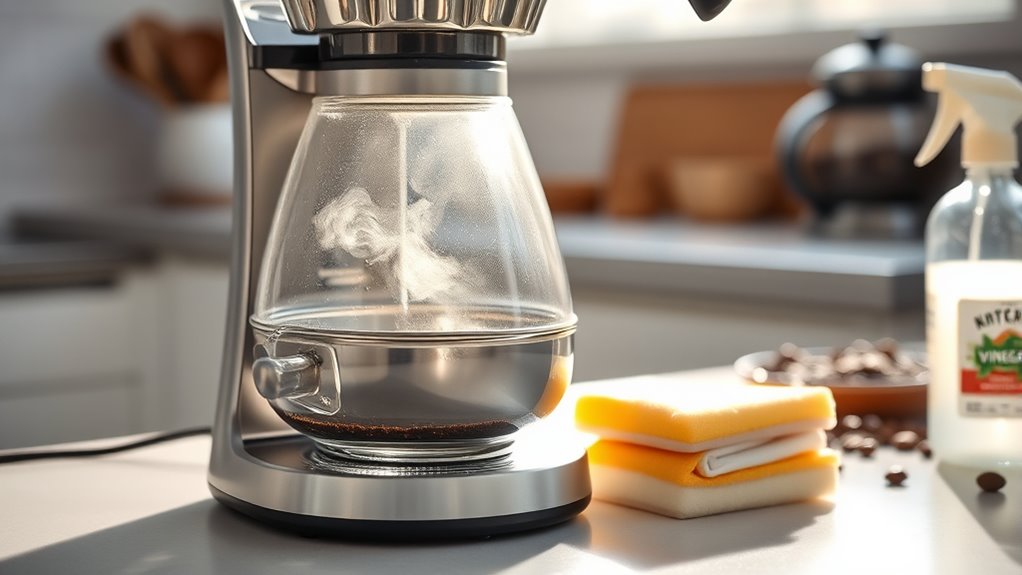
To keep your coffee maker running smoothly and your brew tasting fresh, establish a regular descaling schedule. Always use fresh, filtered water to prevent mineral buildup and improve flavor. These simple steps help you avoid future messes and enjoy better coffee every time.
Regular Descaling Schedule
Establishing a regular descaling schedule is essential to prevent mineral buildup and guarantee your coffee tastes its best. Over time, calcium deposits and mineral buildup can clog your machine’s internal components, affecting brewing performance and flavor. By descaling every 1 to 3 months, depending on your water hardness and usage, you reduce the risk of these issues. Use a descaling solution or a mixture of vinegar and water to break down deposits effectively. Consistent scheduling not only keeps your coffee maker functioning smoothly but also prolongs its lifespan. Remember, a clean machine brews better coffee, so stick to your descaling routine and enjoy fresh, flavorful cups every time. Regular maintenance truly makes a difference.
Use Fresh, Filtered Water
Using fresh, filtered water in your coffee maker can substantially reduce mineral buildup and improve the flavor of your brew. Water quality directly impacts your machine’s performance by minimizing mineral deposits that cause clogs and scale. To keep your coffee tasting great and prevent future buildup, consider these tips:
- Use filtered water instead of tap water to reduce minerals.
- Regularly change your water filter to maintain its effectiveness.
- Avoid using distilled water, which can harm your machine’s components.
- Keep water levels consistent to prevent dry brewing and mineral buildup.
- Consider installing a water softener if your tap water is hard.
When to Call in a Professional for a Thorough Cleaning
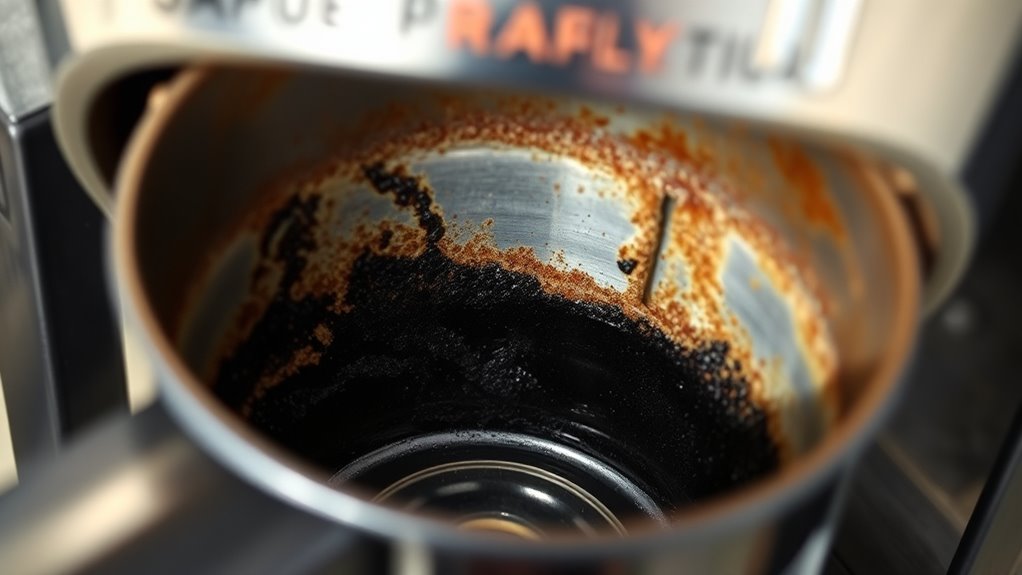
Sometimes, a DIY cleaning just isn’t enough to restore your coffee maker’s performance. If you notice lingering odors, stubborn mineral buildup, or your machine isn’t brewing properly, it’s time to seek professional assistance. A thorough cleaning by a specialist can address hidden clogs and scale that regular descaling might miss. Professionals perform deep cleaning that restores your coffee maker’s efficiency and prolongs its lifespan. If you’ve tried multiple cleaning cycles, used proper descaling solutions, and still encounter issues, don’t hesitate to contact an expert. They have the tools and expertise to tackle tough deposits and ensure your machine operates at peak performance. Recognizing when to call in help can save you time and prevent costly repairs down the line.
Frequently Asked Questions
How Often Should I Clean My Coffee Maker for Optimal Performance?
You should clean your coffee maker at least once a month for peak performance. Stick to a maintenance schedule that includes regular use of cleaning tools like descaling solutions and brushes to remove mineral buildup and residue. If you brew coffee daily, consider cleaning every two weeks. This routine helps prevent clogs, guarantees great-tasting coffee, and prolongs your machine’s lifespan. Stay consistent to enjoy the best coffee experience.
Can Using Filtered Water Reduce Buildup in My Coffee Machine?
Using filtered water can dramatically cut down mineral deposits and extend your coffee maker’s lifespan. Water quality makes all the difference—regular tap water is packed with minerals that cause buildup and clog your machine. Switch to filtered water, and you’ll see a huge difference in how clean your coffee stays and how smoothly your machine runs. It’s like giving your coffee maker a health boost every single day!
Are There Any Health Risks Associated With a Dirty Coffee Maker?
A dirty coffee maker can pose health risks like mold growth and bacterial contamination. When you neglect cleaning, mold spores can develop inside, potentially causing allergic reactions or respiratory issues. Bacteria can multiply in leftover residue, leading to stomach illnesses if consumed regularly. To stay safe, clean your machine frequently with vinegar or specialized cleaners, and always rinse thoroughly to prevent mold and bacteria buildup.
What Are Common Mistakes to Avoid During Cleaning?
Imagine your coffee maker as a loyal garden that needs gentle tending. Avoid using harsh chemicals, which can harm your machine and compromise health. Neglecting regular descaling allows mineral buildup to take over, like weeds choking your plants. Don’t skip thorough rinsing after cleaning, or residues might linger. These mistakes turn your trusted appliance into a source of mold or bacteria, ruining your coffee and risking your well-being.
How Does Cleaning Frequency Vary Between Different Coffee Machine Types?
You should clean your coffee machine more frequently if you own a drip brewer, aiming for weekly brew maintenance to prevent buildup and extend its lifespan. For single-serve machines, bi-weekly cleaning usually suffices. Espresso machines might need monthly deep cleans. Adjust cleaning schedules based on usage to keep your machine running smoothly, ensuring ideal brew quality and prolonging its lifespan. Regular maintenance is key to avoiding costly repairs.
Conclusion
Keeping your coffee maker shining isn’t just about good taste—it’s about preserving its secret charm. With a little regular care, you’ll enjoy richer brews and a machine that whispers efficiency. Think of it as nurturing a loyal companion; a little attention now protects your mornings for years to come. So, stay attentive to its needs, and your coffee routine will remain a delightful ritual, full of fresh, inviting aromas every single day.
